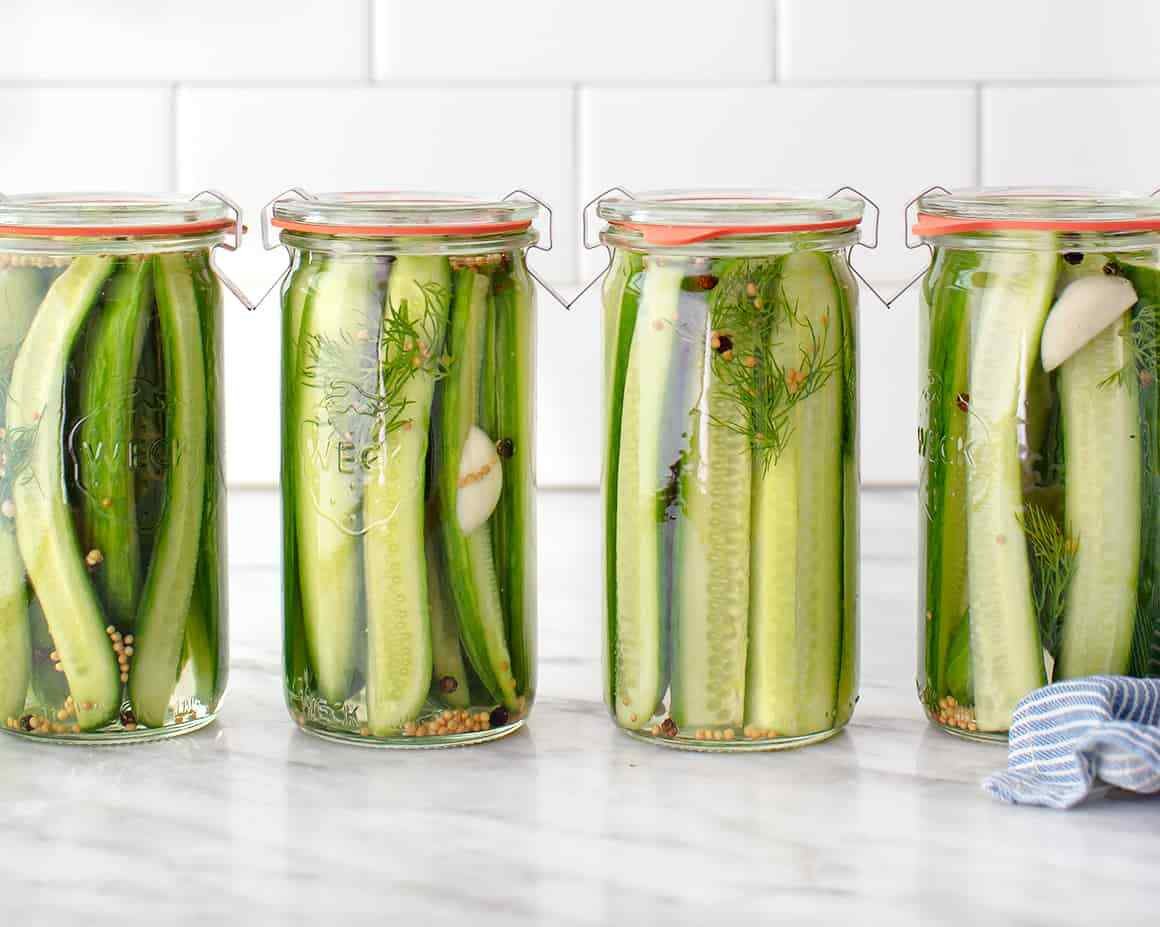You’ve just opened a jar of pickles, enjoying their crisp, tangy goodness. But then you wonder, “Do I really need to refrigerate these?”
If pickles are not refrigerated after opening, they can spoil quickly due to the growth of harmful bacteria and yeasts. Unrefrigerated pickles may become soft, mushy, and develop off-flavors or odors. To maintain quality and safety, always store opened pickles in the refrigerator and consume them within 2-3 months.
So, what exactly happens when you leave your pickles out? Let’s take a closer look at the science behind proper pickle storage and the risks of not refrigerating them.
What Happens When Pickles Are Not Refrigerated?

When pickles are left out of the refrigerator, their preservation process decelerates, which can lead to spoilage because of bacterial growth and excessive fermentation. This happens as the cool temperatures of a fridge help slow down the activities of bacteria and yeasts that cause spoilage, maintaining the desired fermentation process.
At warmer temperatures, these microorganisms find a more favorable environment to proliferate, raising the risk of the pickles becoming unsafe to eat.
Although the acidic nature of pickle brine provides some level of protection against these microorganisms, this defense mightn’t be sufficient over extended periods without the aid of cold storage.
Keeping these considerations in mind is crucial for ensuring the pickles’ quality and safety, making them a tasty part of your diet.
How Long Can Pickles Last Unrefrigerated?

Pickles, those tangy and crunchy delights adding zing to your meals, do need a bit of care after you’ve popped open the jar. If you’ve left them out on the counter, keep an eye on them because their shelf life isn’t infinite once the seal is broken.
An unopened jar of pickles can sit at room temperature for a cool 2 years, or even more. But after you’ve opened them, the countdown begins. Typically, an opened jar of pickles should be refrigerated, but if you forget, you’re working with a shorter time frame.
You’re probably asking, “How long is too long for those pickles sitting out?” Well, without refrigeration, they can still be good for several hours, especially if you’re serving them at a meal and they’re not left sitting out all day.
But beyond that, it’s a gamble. The brine can only protect the pickles for so long at room temperature before the quality starts to decline.
Should you spot any changes in the pickles’ color, if they lose their crunch, or the brine gets an off smell, it’s time to part ways with your beloved pickles. And, if you see any mold, please don’t take a chance—throw them out.
Can You Eat Unrefrigerated Pickles?

Sure, you might want to nibble on those pickles that sat on the counter overnight, it’s crucial to comprehend the possible dangers.
Yes, unrefrigerated pickles can be consumed, but there’s a catch. Pickles possess vinegar, a natural preservative. But, when they’re exposed and left out, the chance of bacterial multiplication elevates, possibly causing foodborne sickness.
Here is a more detailed explanation:
| Unrefrigerated Pickles | |
|---|---|
| Advantages | Vinegar serves as a natural preservative |
| Disadvantages | Risk of bacterial multiplication escalates once exposed |
| Key Point | Eat responsibly and always check smell and appearance before eating |
Signs Your Unrefrigerated Pickles Have Gone Bad

If you’ve left your pickles out of the fridge after opening, spoiler alert: they may not last as long as you’d hope. You’ll want to look out for a few tell-tale signs that your pickles have gone bad. Trust your senses—they’re your best pals in identifying if those pickles should head to the trash.
- Sight: Check the appearance of the pickles and brine. If you spot any funky colors or the brine looks cloudy instead of clear, that’s a red flag. Discoloration is a clear indication that your pickles may have overstayed their welcome.
- Smell: Your nose knows. One whiff of a bad pickle can send a clear message. If the smell is off and not the usual tangy pickle scent, consider them compromised.
- Texture: Are the pickles soft or slimy? They should be crisp to the bite. If not, they’ve probably gone bad. Softness is a sign your pickles have lost their pep.
- Mold: This one’s straightforward. Visible mold means it’s time to say goodbye. Mold can be a white film or fuzzy spots of various colors. If mold is in sight, avoid a bite.
- Taste: If you’re brave and the pickles have passed the sight and smell test, a tiny taste can be telling. Any strange flavors? If it makes your taste buds question your life choices, don’t eat more.
Can You Re-Refrigerate Pickles After They’ve Been Left Out?

You can certainly put pickles back in the refrigerator after they’ve been left out, but it’s crucial to consider how long they’ve been exposed to room temperature to ensure they remain safe and of good quality.
If the pickles were out for less than two hours, they should be safe to refrigerate again. This period reduces to only one hour if the temperature of the environment was above 90°F, according to USDA guidelines concerning perishable items.
The basis for this guideline is the growth pattern of bacteria. Most harmful bacteria multiply rapidly between 40°F and 140°F, known as the ‘Danger Zone.’ It’s vital to keep pickles out of this temperature range.
Allowing them to sit out makes them gradually enter this zone, posing a risk of becoming a breeding ground for bacteria that could make them unsafe.
Moreover, the acidic content of pickles does offer some level of defense against bacteria. Nevertheless, this shouldn’t be the sole factor relied upon for ensuring their safety.
Keeping a close eye on how long they’ve been left out and making sure they’re stored at a temperature below 40°F when put back in the fridge is essential. This careful management ensures the pickles remain safe and enjoyable for later consumption.



